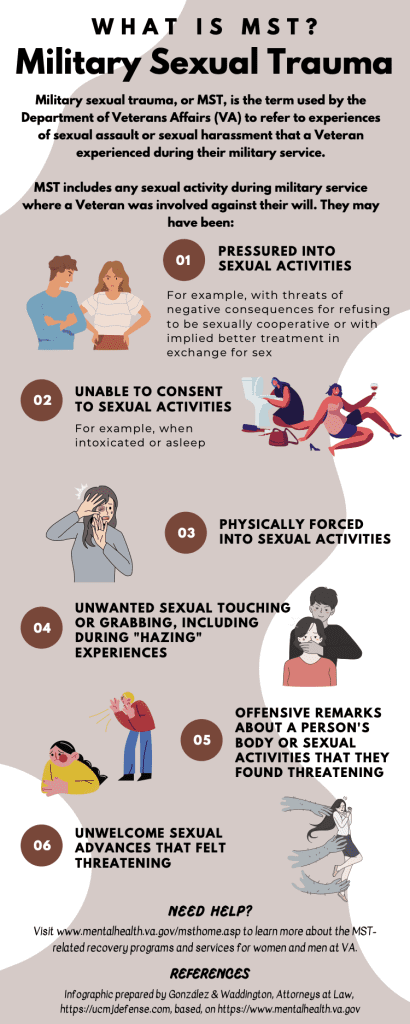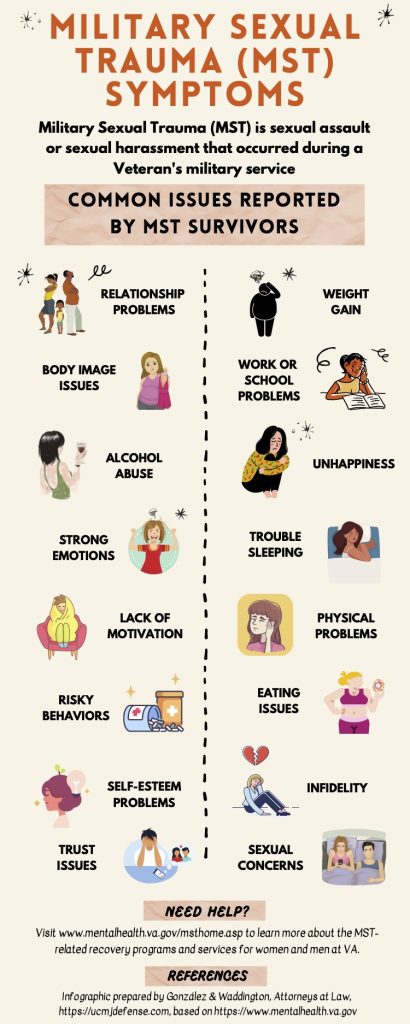Rape Trauma Syndrome and Military Sexual Assault Cases
What is Rape Trauma Syndrome in the Military?
Rape trauma syndrome can help validate a victim’s declaration of lack of consent and help a jury understand the typical responses of rape victims. Testimony is considered unfairly biased and intrusive to the jury if it is used to prove that the rape occurred (for example, if the expert believes the victim was raped or has an RTS). However, testimony is generally considered less biased if the examiner uses the term PTSD versus RTS if the respondent claims that the applicant’s behavior is incompatible with the applicant’s behavior.
Victim Responses to Military Sexual Assault
The rape survivor can experience a wide range of emotions immediately following an attack. Multiple factors impact the survivor’s emotional response.
- The degree of support they have experienced from friends and family.
- The previous self-esteem of the victim, personal strength of the survivor.
- Professional treatment after the attack.
- Involvement in the criminal justice system
- The prior knowledge of survivors of the attacker,
- and so forth.

Infographic Military Sexual Trauma – MST Symptoms VA Disability Ratings
Victimology of Sexual Assault Survivors
The external adaptation phase can last several months to several years after the rape. During this phase that can last from several weeks to months or even longer, the victim of sexual assault does not appear traumatized and shaken as during the acute phase immediately after the attack. Victims often begin to develop acute symptoms after the initial shock of the attack subsides. The duration depends on how long the victim can remain in the acute phase.
Physical Responses to Military Sexual Assault
Finally, rape survivors may experience physical symptoms, which are physical, while others are psychological, mainly related to rape. Rape survivors may experience depression, nightmares, fear, anxiety, social dysfunction, and sleep disorders. If the attack is resolved, the survivor may begin to experience the physical and emotional symptoms she initially experienced. Anxiety and fear may become less obvious when the survivor returns to normal.
Emotional Responses to Military Sexual Assault
However, most rape victims experience a predictable range of emotions after being attacked. While victims may look at sexual abuse and its aftermath with sadness, the feelings of abuse at other stages are not as strong, overwhelming, or destructive as they once were. Many victims believe that their lives have changed forever since then. If you have been raped or otherwise sexually assaulted, it is highly likely that you have experienced or continue to experience RTS.
Infographic on Military Sexual Trauma MST-VA Disability for Military Sexual Assault PTSD
Psychological Trauma from Military Sexual Assault
Rape trauma syndrome (RTS) is a psychological trauma experienced by a rape victim, including disruption of normal physical, emotional, cognitive, behavioral, and interpersonal characteristics. Rape trauma syndrome (RTS) is a form of psychological trauma experienced by a rape victim, which consists of impairment of normal physical, emotional, cognitive, behavioral, and interpersonal characteristics.
What is Rape Trauma Syndrome?
It is considered a syndrome because victims of sexual violence develop standard and consistent forms of behavior, thoughts, and feelings.
RTS describes a series of psychological and physical signs, symptoms, and reactions common to most rape victims during, after, months or years of rape. However, subsequent research conceptualized rape trauma as a specific diagnosis and symptom rather than a recovery phase. Rape Trauma Syndrome (or RTS) is related to PTSD but is more specifically used for sexual assault.
Long Term Impacts of Military Sexual Assault
Often, sexual assault survivors become hypersexual or promiscuous through sexual assaults, sometimes to assert control over their sexual relationships. Still, they also suffer from deep internal turmoil, which manifests differently when the survivor experiences sexual assault.
However, they also suffer from deep internal turmoil, which can manifest differently when the survivor experiences long-term trauma from rape. According to Lacey and Roberts, less than half of male victims sought psychotherapy within six months, and the median time between assault and therapy was 2.5 years. King and Woollett involving over 100 male rape victims, found that the average time between assault and therapy was 16.4 years.

